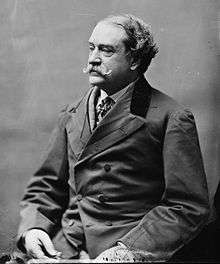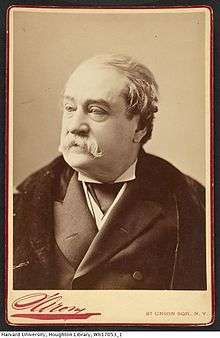John Brougham

John Brougham (May 9, 1814 – June 7, 1880) was an Irish-American actor and dramatist.
Biography
He was born at Dublin. His father was an amateur painter, and died young. His mother was the daughter of a Huguenot, whom political adversity had forced into exile. John was the eldest of three children. The other two died in youth, and, the father being dead and the widowed mother left penniless, the surviving boy was reared in the family and home of an uncle. He was prepared for college at an academy at Trim, County Meath, twenty miles from Dublin, and subsequently was sent to Dublin University. There he acquired classical learning, and formed interesting and useful associations and acquaintances; and there also he became interested in private theatricals. Brougham fell in with a crowd that put on their own shows, cast by drawing parts out of a hat. Though he most always traded off larger roles so he could pay attention to his studies, Brougham took quite an interest in acting. He was a frequent attendant, moreover, at the Theatre Royal in Hawkins Street. The impetus toward his theatrical career was, doubtless, received by him at this time and in this way.
He was educated with the intention of his becoming a surgeon,[1] and walked the Peth Street Hospital for eight months, but misfortune came upon his uncle, and so the youth was obliged to provide for himself. Before leaving the university he, by chance, had become acquainted with the actress Madame Vestris. He went to London in 1830, and, after a brief experience of poverty, suddenly determined to become an actor. He was destitute of everything except fine apparel, and he had actually taken the extreme step of offering himself as a cadet in the service of the East India Company; but, being dissuaded by the enrolling officer, who lent him a guinea and advised him to seek for other employment, and happening to meet with a festive acquaintance, he sought recreation at the Tottenham Theatre (afterward the Prince of Wales's) where Madame Vestris was acting.
His acquaintance with Madame Vestris led to him being engaged at the theatre, and he thus made his first appearance on the London stage in July in Tom and Jerry, in which he played six characters. In 1831 he was a member of Madame Vestris's company, and wrote his first play, a burlesque. He remained with Madame Vestris as long as she and Charles Mathews retained Covent Garden, and he collaborated with Dion Boucicault in writing London Assurance, the role of Dazzle being one of those with which he became associated.[2] His success at small or "low" comic roles such as Dazzle earned him the nickname "Little Johnny Brougham," a moniker which he embraced and which boosted his popularity with working-class audiences.
In 1840 he managed the Lyceum theatre, for which he wrote several light burlesques, but in 1842 he moved to the United States, where he became a member of WE Burton's company, for which he wrote several comedies, including Met-a-mora; or, the Last of the Pollywogs, a parody of John A. Stone and Edwin Forrest's Metamora; or The Last of the Wamponoags, and Irish Yankee; or, The Birthday of Freedom. Later he was the manager of Niblo's Garden, and in 1850 opened Brougham's Lyceum, which, like his next speculation, the lease of the Bowery Theatre, was not a financial success, despite the popularity of such works as Po-ca-hon-tas; or, The Gentle Savage. He was later connected with Wallack's and Daly's theatres, and wrote plays for both.[2]

In 1860 he returned to London, where he adapted or wrote several plays, including The Duke's Motto for Fechter. In November 1864 he appeared at the Theatre Royal in his native Dublin in the first performance of Dion Boucicault's Arrah-na-Pogue with Boucicault, Samuel Johnson and Samuel Anderson Emery in the cast.[3] After the American Civil War he returned to New York City. Brougham's Theatre was opened in 1869 with his comedies Better Late than Never and Much Ado About a Merchant of Venice, but this managerial experience was also a failure, due to disagreements with his business partner, Jim Fisk, and he took to playing the stock market. His last appearance was in 1879 as O'Reilly, the detective, in Boucicault's Rescued, and he died in New York City.[2]
Brougham wrote upwards of 120 plays, mostly comedies, earning him the nickname "The American Aristophanes" from critics of the time. He was the founder of the Lotus Club in New York, and for a time its president. He also edited there in 1852 a comic paper called The Lantern, and published two collections of miscellaneous writings, A Basket of Chips and The Bunsby Papers. Brougham is said to have been the original of Harry Lorrequer in Charles Lever's novel. He was twice married, in 1838 to Emma Williams (d. 1865), and in 1844 to Mrs Annette Hawley (d. 1870), both actresses.[2]
Notes
- ↑ Chisholm 1911.
- 1 2 3 4
 One or more of the preceding sentences incorporates text from a publication now in the public domain: Chisholm, Hugh, ed. (1911). "Brougham, John". Encyclopædia Britannica. 4 (11th ed.). Cambridge University Press. p. 652.
One or more of the preceding sentences incorporates text from a publication now in the public domain: Chisholm, Hugh, ed. (1911). "Brougham, John". Encyclopædia Britannica. 4 (11th ed.). Cambridge University Press. p. 652. - ↑ "Samuel Johnson c.1830-1900 A Life from the Grave, by Jennie Bisset". The Irving Society. November 2013.
References
 Stephen, Leslie, ed. (1886). "Brougham, John". Dictionary of National Biography. 6. London: Smith, Elder & Co.
Stephen, Leslie, ed. (1886). "Brougham, John". Dictionary of National Biography. 6. London: Smith, Elder & Co.  Wilson, James Grant; Fiske, John, eds. (1900). "Brougham, John". Appletons' Cyclopædia of American Biography. New York: D. Appleton.
Wilson, James Grant; Fiske, John, eds. (1900). "Brougham, John". Appletons' Cyclopædia of American Biography. New York: D. Appleton.
External links
- Works by John Brougham at Project Gutenberg
- Works by or about John Brougham at Internet Archive
- John Brougham Photograph part of the Nineteenth Century Notables Digital Collection at Gettysburg College